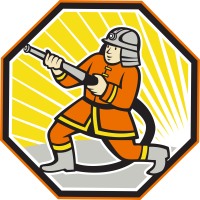How to be a Firefighter
Becoming a firefighter is a noble and challenging career path that requires a combination of education, physical fitness, and practical training. If you or someone you know is interested in how to be a firefighter, here's a guide for teenagers or parents on the requirements and preparation needed:

For Children/Teenagers:
1. Educational Foundation:
- Focus on a well-rounded education emphasizing science, particularly
biology and chemistry. Understanding these subjects can be beneficial
in firefighting.
2. Physical Fitness:
- Start
maintaining good physical fitness. Firefighters need to be in excellent
shape to perform the demanding tasks associated with the job.
3. Volunteer Opportunities:
- Explore volunteer opportunities with local fire departments or
community service organizations. This can provide valuable exposure to
the firefighting environment.
4. Develop Teamwork and Leadership Skills:
- Engage in activities that foster teamwork and leadership skills.
Firefighting is a collaborative effort, and strong interpersonal skills
are crucial.
5. Obtain CPR and First Aid Certification:
- Consider obtaining CPR and First Aid certification. These skills are often prerequisites for firefighter training.
6. Research Firefighter Training Programs:
- Look into firefighter training programs in your area. Some fire
departments offer junior firefighter programs for teenagers.
For Parents:
1. Encourage Physical Activity:
- Encourage your teenager to participate in physical activities that enhance strength, endurance, and overall fitness. Firefighters need to meet specific physical standards.
2. Discuss Career Goals:
- Have open conversations about your teenager's career goals. If firefighting aligns with their aspirations, provide support and guidance.
3. Support Education:
- Reinforce the importance of education. While a high school diploma is typically the minimum requirement, further education can enhance career opportunities within the fire service.
4. Explore Fire Explorer Programs:
- Investigate if there are Fire Explorer programs available in your area. These programs are designed for young individuals interested in firefighting and emergency services.
5. Participate in Community Events:
- Attend community events organized by the fire department. This can provide networking opportunities and a chance to learn more about the profession.
General Steps for Becoming a Firefighter:
1. Educational Requirements:
- Obtain a high school diploma or equivalent. Some fire departments may require additional education or certifications.
2. Physical Fitness:
- Maintain excellent physical fitness. Firefighter candidates must often pass physical agility tests as part of the application process.
3. Emergency Medical Technician (EMT) Certification:
- Consider obtaining EMT certification. Many fire departments require or prefer candidates to have at least basic EMT certification.
4. Firefighter Training Program:
- Enroll in a firefighter training program. These programs, often offered by community colleges or fire academies, provide the necessary skills and knowledge.
5. Pass Written and Physical Exams:
- Successfully pass written exams that assess your knowledge of firefighting procedures. Additionally, pass physical agility tests to demonstrate your physical capabilities.
6. Gain Experience Through Volunteer Work:
- Consider gaining experience through volunteer firefighting opportunities. This hands-on experience can enhance your resume and provide valuable insights.
7. Apply to Fire Departments:
- Apply to fire departments that align with your career goals. Be prepared for a competitive application and interview process.
8. Continue Professional Development:
- Pursue ongoing professional development opportunities. Specialized certifications, additional education, and training courses can enhance your skills and advance your career.
9. Pass Background Checks and Medical Examinations:
- Successfully pass background checks and medical examinations, standard firefighter position requirements.
10. Participate in Probationary Period:
- If selected, go through a probationary period for further evaluation of your skills and performance.
If your child or teenager wants to be a firefighter, encourage them to learn how to be a firefighter by telling them that it requires dedication, physical fitness, and a commitment to serving the community. It's essential to stay informed about specific requirements in your region and actively engage in the preparation process. The journey to becoming a firefighter is both challenging and rewarding.
What's in our homeschool...
Finding the right homeschooling curriculum that best fits my children's needs was one of the most significant challenges I had when we first started our journey. I found different curricula that best suit my children's needs...
As a parent, a homeschooled reading curriculum was at the top of my mind when we started homeschooling. English was one of the requirements in our state, and what better way to learn English than to read. Getting kids interested...
There are various homeschool math curricula that you can use in your homeschooling. As for me, I use Mathletics and Khan Academy for my children. They are beneficial for us. I use Mathletics for our homeschool math ...
A homeschool art curriculum has a lot of benefits to children. This includes the development of language and communication skills, dexterity, motor skills, creativity, focus, persistence, problem-solving skills, collaboration...
Our homeschool science curriculum includes a few different things. Science is really a wonderful thing to be studied and explored. When we introduce our children to various opportunities for science learning, they will experience...




